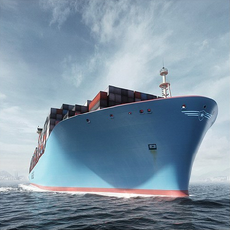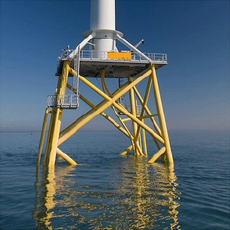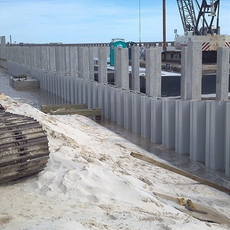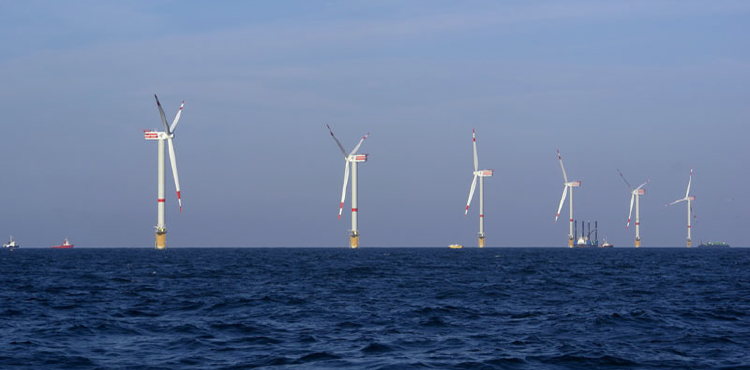Ship・Marine Structure Maintenance System
Ship・Marine Structure Maintenance System ICCP/ICAF + MGPS
Steel Structure Protection and Cathodic Protection for Prevention of Corrosion System [Impressed Current Cathodic Protection (ICCP)]
Two types of cathodic prevention for anti-corrosion of marine steel structures
Marine steel structures immersed in the ocean form natural differences in electrical potential from which corrosion begins.
One solution for protecting steel marine structures against corrosion for electrical cathodic prevention of rust, is a method that attaches an electric cathode on the outside.
The first method of cathodic protection is a conventional “dissolve sacrificial anode and attach it to a steel structure” system.
The second method is a wind powered marine turbine electric current cathodic rust prevention (ICCP) system that makes full use of the power supply unit.
Risk of protection systems using conventional sacrificial anodes 【1】
Extraordinary material cost such as coatings
Marine steel structures turn into a cathode when in contact with cathodic materials in water.
Conventional to general use sacrificial anodes like aluminum, zinc and magnesium alloys are used in order to protect marine steel structures.
Wind powered Marine turbines are designed to usually last more than 25 years during which sacrificial anodes (like aluminum, zinc and magnesium alloys) of several hundred tons must be attached to the base of immersed steel marine structures to protect it from corrosion.
Therefore, expensive material and installation labor cost must be added.
①Painted Coating
Requires coating using expensive paint for sea water.
②Requires periodic recoating.
A run up in periodic maintenance expense of the coating operation in 1 because resistance of paint to sea water is low.
③Recoating in the ocean is impractical.
Becomes costly to surface equipment from the water when recoating.
Risk of protection systems using conventional sacrificial anodes 【2】
Maintenance such as inspecting the state of protectiveness is extraordinarily expensive.
Conventional sacrificial anodes can’t verify the protective state of the base of steel structures in the ocean.
Therefore, it becomes very expensive to obtain the data of the protective state of the base from a number of other steel structures.
By this means, it is practically impossible to obtain all the data from groups of wind powered electric marine generation.
Because obtaining data using deep sea divers is extremely dangerous in bad weather, you can’t predict the kind of expenses that will pile up while waiting for the weather to change.
Risk of protection systems using conventional sacrificial anodes 【3】
Dissolved metallic material based environmental contamination
Conventional sacrificial anode based protection destroys the marine environment with several thousand tons of metallic substances that dissolve in the ocean.
The clean image of wind power energy is a contradiction.
Creating clean energy from steel structures that discharge several thousand tons of aluminum and zinc into the ocean is extremely ridiculous.
Furthermore, expensive coatings mean nothing when the paint and almost half the length of the pile of sacrificial anodes peel off in the ocean during installation.
Risk of protection systems using conventional sacrificial anodes 【4】
Physical limitations of sacrificial anodes
Based on simulation data from approved computers in this field, sacrificial anodes can protect up to a depth of about 15 meters but cannot provide suitable protection in depths beyond that.
If the base of a steel structure is 60 meters below sea level, the protective capability of the surface area is 24% lower then the total base of the structure.
This becomes a big risk if the life span is expected to be more than 25 years.
The ICCP system solves the risk of conventional sacrificial anodes.
Wind powered marine turbine electric current cathodic rust prevention ICCP is the most advanced technology that can mitigate the risk introduced by using conventional sacrificial anodes.
Wind powered marine turbine electric current cathodic rust prevention ICCP is shown as ICCP. The ICCP anode is a non-consumable material using electricity and releasing current as needed, preventing galvanic corrosion.

Preventing corrosion of ships traveling in the ocean.

Preventing damage of steel marine structures from salt.

Preventing damage of coastal structures from salt.
6 characteristics of the ICCP system
①More than 50 years of protection
ICCP anode life span is more than 50 years.
If this system is installed at the base of a steel marine structure, replacement of conventional sacrificial anodes for preventing corrosion of wind powered marine turbines generally last more than 25 years.
Based on results of computer simulations, it can be said that because electric current easily reaches bases buried at sea depths of 30 meters, sections in contact with the sea water can be well protected for more than 25 years.
Note) Compared with a sacrificial anode, only attaching a few ICCP anodes and a reference anode takes time to mount.
②5 year maintenance free automatic control
Basic maintenance is unnecessary with just periodic inspections every 5 years as the entire system is automatically controlled.
*According to the shipping classification society, annual inspection is not necessary compared with sacrificial anodes.
③Coating Unnecessary
Making expensive coatings unnecessary is one of the big benefits of installing an ICCP system.
④Realizing cost performance
As explained above in the section “Risk of protection systems using conventional sacrificial anodes” in “Risk 2: Maintenance such as inspecting the state of protectiveness is extraordinarily expensive”, it would be very unrealistic to say that it is not just the enormous cost of things like construction, maintenance and repair in conventional sacrificial anode based protection if more than 100 thousand wind turbines are set up in a wind farm. ICCP makes it feasible.
⑤Data management makes it possible to get the latest conditions anytime
Because remote control is possible at the tip of the power supply unit, it is easy to get data such as ocean temperature, state of protection and measurements like wind speed anytime through the Internet using a land based PC terminal.
Management of the power unit can be maintained by downloading the latest software and updating the firmware via a PC terminal.
⑥Batch management through software
ICCP wind power turbine software can manage an unlimited number of wind turbines together in a wind farm, and verify the protective state of all marine wind turbines in a wind farm through a PC terminal.
https://www.corrosion.nl/iccp-cathodic-protection
The Impressed Current Anti-Fouling/Marine Growth Protection System [ ICAF / MGPS ]
Mechanism to prevent marine life adhesion and breeding
The Impressed Current Anti-Fouling/Marine Growth Protection System [ ICAF / MGPS ] is an artificial electrical potential difference between a steel anode (positive electrode) and steel plate cathode (negative electrode). Copper dissolves in sea water and a protective current flowing from positive electrode to negative electrode thereby prevents organisms from sticking to and protecting marine structures such as air conditioners (heat exchangers).
Because this control panel device can control the amount dissolved in anodal sea water based marine environments, it exercises protective functionality and maintains marine equipment in its best condition in every sea environment.
Furthermore, it extends the anodes life.
[Example 1] Protects the outside of marine equipment!
Prevents functional damage of coolers (heat exchangers)
Adhesion of marine life (mainly, barnacles, muscles, algae and shell fish) is one reason for cooler (heat exchanger) malfunction.
The Impressed Current Anti-Fouling/Marine Growth Protection System [ ICAF / MGPS ] inhibits growth and adhesion of these types of creatures.
[Example 2] Protects internal marine plumbing!
Prevents malfunctioning sea water supply pipes.
Concern for problems of marine life growth and adhesion to marine facility sea water supply lines.
Without exception the cost of removing marine life growth and adhesion can be a big issue depending on pipe characteristics.
If the Impressed Current Anti-Fouling/Marine Growth Protection System [ ICAF / MGPS ] is used, a steel anode connected to a control panel is attached to a sea chest (sea water suction inlet) or strainer (filter).
It prevents marine life growth and adhesion to internal piping by adjusting the amount of steel dissolving in sea water based on the appropriate control panel setting.
Main characteristics of the Impressed Current Anti-Fouling/Marine Growth Protection System [ ICAF / MGPS ]
- Touch display operation in all main languages
- Auto adjusting current anode quantity check functionality (with alarm)
- Remaining quantity display function (with alarm)
- Automatic data duplication function (when SD card inserted)
- Information download/Software update
- Stop/Start function to protect a temporary sea water pump stoppage (numerical input capable of saving anode material)
- Windows hyper-terminal send/receive functionality (requires Internet connection)
- Data save system
- Voltage reduction/short circuit (with alarm)
- Anode polarity check (with alarm)
- Connection to Ship Management System via RS485 and RS232 (optional).











![The Impressed Current Anti-Fouling/Marine Growth Protection System [ ICAF / MGPS ]](https://www.kandk-kk.co.jp/wp/wp-content/uploads/2016/06/c5fa_6_1_01_05-2.png)
![[Example 1] Protects the outside of marine equipment!](https://www.kandk-kk.co.jp/wp/wp-content/uploads/2016/03/c5fa_6_1_01_06.png)
![[Example 2] Protects internal marine plumbing!](https://www.kandk-kk.co.jp/wp/wp-content/uploads/2016/03/c5fa_6_1_01_07.png)